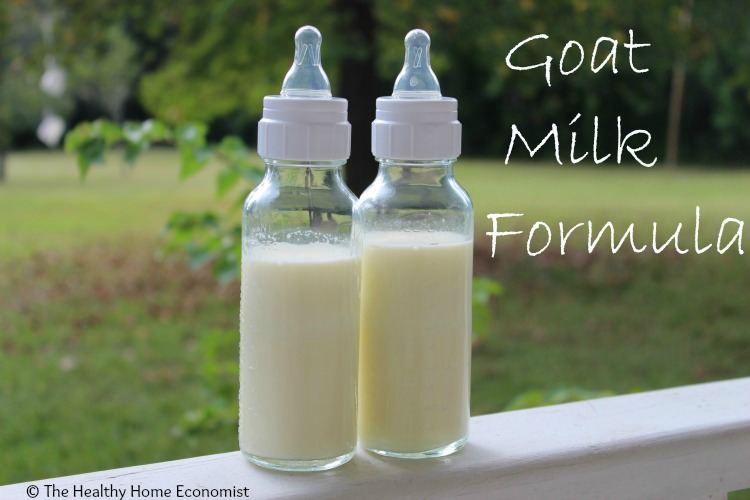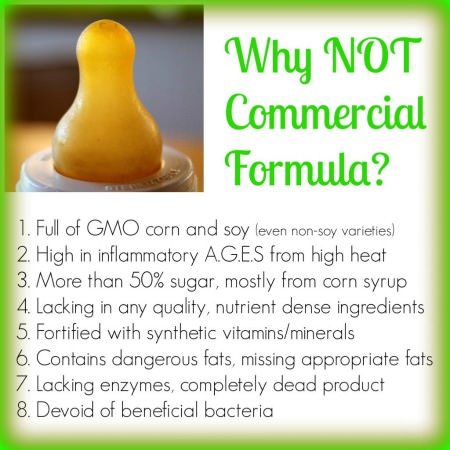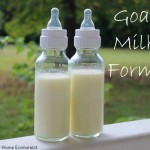How to make a nourishing homemade goat milk baby formula that mimics human breastmilk as closely as possible.

I nursed all 3 of my children exclusively until they started solid foods. In addition, I practiced extended breastfeeding, nursing each of my first two children for 2 years and the youngest for 4 years. I only used homemade formula occasionally such as after surgery.
I adored every. single. minute.
Nursing my children was a glorious experience the memories of which I will cherish forever! I’m sure most breastfeeding mothers would report the same.
The topic of homemade formula, even the more widely accepted goats milk formula, is a highly charged and controversial subject. In reality, it is a very important option for women to consider and have available who are not able to have a breastfeeding relationship with their baby.
This is because unpasteurized, donor breastmilk is not always available from reputable sources and in sufficient quantities to meet a baby’s growing appetite. A friend of mine is dealing with this very situation right now with her adopted daughter.
While she does her best to secure quality donor milk, the truth is that it isn’t enough, and she must supplement. Her first choice depending on local farm availability is formula made with raw goats milk as it seems to be digested a bit better by her baby.

Of course, all brands of commercial formula even if organic are best avoided if at all possible. The graphic above summarizes the problems with commercial formula quite succinctly.
Why Goat Milk is Healthy for Baby Formula
With commercial formula best avoided and relying solely on donor breastmilk a risky proposition, the homemade formula becomes an option well worth consideration.
But why goats milk formula in particular?
The reasons could be as simple as the availability of goat milk versus cow milk. The homemade formula is best made with a clean source of raw milk and some parts of the country have raw goat milk far more readily available than raw cow milk.
Another reason could be the digestibility of the formula. The natural homogenization of the fat globules and different structures of the goat milk proteins do make it easier to digest for some babies.
If a baby has trouble with a homemade formula made from raw grass-fed cow milk, for instance, then the next best option would indeed be goats milk formula.
I always suggest to mothers to try homemade formula made with cow milk first.
This is because although goat milk is wonderfully rich in brain-building fats, it must be used with caution in infant feeding.
Unlike cow milk, goat milk lacks folic acid and is low in the nutrient vitamin B12 both of which are critical to the proper growth and development of a baby.
Fortunately, if goats milk formula does indeed become the necessary choice, the inclusion of small amounts of nutritional yeast and organic grated or desiccated liver in the formula easily remedies this dilemma.
Infant Formula?
Below is the recommended recipe for goats milk formula as published by the Weston A. Price Foundation and originally published in the cookbook Nourishing Traditions in 1996.
I personally know at least a dozen women who have used this recipe with great success when raw grass-fed cow milk was either unavailable or did not digest well for their baby.
*You can order all of the required ingredients for the homemade baby formula in one easy package from Radiant Life by clicking here.
Because the goat formula contains liver powder, be sure to use bottle nipples that are designed for thicker flowing liquids. You can get them here.

Homemade Goat Milk Formula Recipe
A nourishing homemade goat milk formula made from goat milk, yogurt or kefir devised and tested by Dr. Mary Enig that matches the nutritional profile of breastmilk as closely as possible.
Ingredients
- 2 cups raw goat milk OR whole goat milk yogurt
- 1 7/8 cup filtered water
- 1/4 cup liquid whey
- 4 Tbl goat lactose
- 1/4 tsp bifidobacterium infantis powder
- 2 Tbl raw or pasteurized cream
- 1/2 tsp cod liver oil unflavored
- 1/4 tsp butter oil unflavored
- 1 tsp sunflower oil preferably organic
- 1 tsp extra virgin olive oil preferably organic
- 2 tsp virgin coconut oil preferably organic
- 2 tsp nutritional yeast
- 2 tsp raw chicken liver OR 1/4 tsp desiccated liver powder
- 2 tsp gelatin
- 1/4 tsp acerola powder
- 1 tsp molasses optional
Instructions
-
Fill a 2 cup Pyrex measuring cup with filtered water and remove 2 tablespoons (this will give you 1 7/8 cup water).
-
Pour about half the water into a pan and turn burner on medium.
-
Add the gelatin and lactose and let dissolve, stirring occasionally.
-
When gelatin and lactose are dissolved, remove pan from heat and add the rest of the water to cool.
-
Stir in the coconut oil and butter oil until melted.
-
Put remaining ingredients in a glass blender. Be sure to use only liquid whey and never powdered whey from making cheese as it will curdle the goat milk formula.
-
Add the water mixture and blend for about 3 seconds.
-
Pour goats milk formula into glass baby bottles or a large glass jar and refrigerate.
-
Before giving to baby, warm glass bottle in a pan of hot water or a bottle warmer (I like these). Never microwave baby bottles!
Recipe Notes
Do not substitute pasteurized milk or goat milk powder as these are heavily processed, denatured and allergenic foods. You may use plain, whole milk goat kefir or homemade goat yogurt in place of the milk portion of the milk if raw goat milk is not available in your area. Whole Foods has a quality brand of goat milk kefir available.
Cow lactose may be substituted for the goat lactose.
Do NOT use ultrapasteurized (UHT) cream. It is highly allergenic. Raw or pasteurized cream is acceptable.
Use only organic, unrefined, low oleic, cold pressed sunflower oil for this recipe. The brand linked to in the ingredients list is recommended.
The raw chicken liver should be frozen for 14 days or longer as recommended by the USDA for safe consumption. It is easiest to grate raw liver when it is frozen! Alternatively, 1/4 tsp of raw, desiccated liver powder may be substituted (find it here).
Collagen powder may be substituted for the gelatin in a pinch (more on peptides in baby formula in this article).
Use the optional molasses only if baby has issues with constipation. Only use as needed.
Homemade Goat Milk Formula Video
Below is an instructional video I filmed for the Weston A. Price Foundation on how to prepare a homemade formula yourself. Enjoy!
More Information
Homemade Nondairy Baby Formula
Why Soy Formula Even if Organic is So Dangerous for Babies
Traveling with Homemade Baby Formula
Feeding an Adopted Baby Without Commercial Formula
State Threatens to Take Baby Over Homemade Goat Milk Formula
Goat Milk Versus Cow Milk








Here is a link to the goat milk lactose. Thanks for all your help.
mtcapra.com/product/capra-lactose/
Thank you for the info!
I figured it was the processing techniques. Obviously raw milk is superior, but the Mt. Capra brand uses a special drying technique, so the powdered is produced at low temps. It is explained on their website. I would never use meyenburg or any other if I absolutely have to use it for a day or so. I do use goat milk lactose in th formula, but have been adding the molasses. Not using the molasses as a replacement-just a 1/4 tsp or less per bottle. Is that amount okay or should I eliminate it?
Molasses is a developmentally inappropriate food for babies. Please do not add anything to this formula!
Please help! I’m going to run out of goat milk today and I won’t be able to get a new batch until Thursday (2 days from now) I have been very sick. Would goat milk kefir from the store be okay to use for those days? It’s pasteurized since it’s store bought but thought it might be okay since it’s cultured. Thank you.
You can use plain goat milk kefir to make the formula … just substitute kefir for the milk portion of the formula.
Where are you getting the goat milk lactose by the way?
Although unsulphered blackstrap molasses isn’t a liver replacement, how is it not beneficial for baby? It’s a good source of iron, potassium, B6 and magnesium. Also, I am curious how desiccated liver is still nutritious since it’s dried, but milk powder isn’t? If it’s dried, wouldn’t it lose nutrients also?
The desiccated liver is dried at low temperature and is raw at the time of the very minimal processing. It maintains all enzymes, nutrients and cofactors as a result. Milk is pasteurized and then processed violently to produce the milk powder. Totally different processes! Can’t compare the two!
Blackstrap molasses is a wonderful food, yes, but TOTALLY developmentally inappropriate for babies. Lactose is what is in mother’s milk and is what should be added to homemade formula, no molasses.
Thanks for the link. So, if I get the camel milk, would the formula recipe be the same? Is it more comparable to goat or cow milk? Would I need to add the liver/desiccated liver or does it contain enough b12 and folate? Would I make the whey using the camel milk or camel kefir? Or does it matter what source it’s from?
You could make the whey with the camel kefir but it doesn’t matter if you use cow or goat whey from organic store yogurt if you prefer. You do not need to add the desiccated liver. Camel milk is higher in B vitamins including folate than cow milk.
If I am in a bind or run out of fresh milk and would need to use powdered (I have to Mt. Capra brand, which seems to be the best quality available), should I still add the fresh whey or is it always necessary? Do you know if the measurements would still be the same?
Powdered goat milk is not recommended nor it is a healthy option. You can always ship in fresh camel milk right to your door if your local supply is unavailable at certain times of the year. https://www.thehealthyhomeeconomist.com/resources/#16
Hi Sarah
Could you please answer my questions. My baby is intolerant to everything related to cow. Can i still use cream from cows milk? I am afraid he will react to it. He is also intolerant to coconut. Can I replace this with goat ghee?
Thanks
Just leave it out if you can’t replace with another type of cream.
I’m in the same boat. Goat’s milk is not available where I live, so I’ve resorted to the powdered milk. I know it’s not ideal, but is it OK? And if not then why?
Powdered goat milk is not beneficial. It is highly processed, the delicate goat milk proteins are denatured from the powderization process, and it is an allergy risk to baby. I would not use it. Not much better than powdered commercial formula.
Why can’t we use molasses? I’ve been using it in place of the liver. Is that going to be OK?
PLEASE DO NOT SUBSTITUTE ingredients in this formula! Molasses is NOT beneficial for baby and is in no way an adequate nutritional substitute for the liver.